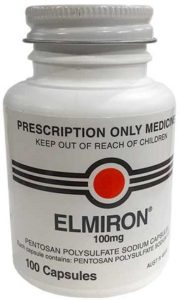Elmiron®, also known as Pentosan Polysulfate Sodium (“PPS”), is the only oral medical approved by the U.S. Food & Drug Administration to treat Interstitial Cystitis (“IC”), commonly referred to as PBS (“Painful Bladder Syndrome”) or IC/PBS. IC/PBS is a condition that largely affects women more than men. The patient suffers from a swollen bladder wall causing significant pain and discomfort in the bladder and pelvic area, urinary frequency, urgency, reduced bladder capacity, and nocturia. It is estimated that more than one-million people in the U.S. are affected by the condition.
 Scientific studies have established that long-term Elmiron use can cause Maculopathy – a major cause of blindness. A 2018 article published by the American Academy of Ophthalmology addressed a study of six patients who took Elmiron for IC/PBS for at least 15 years. The researchers determined that all six chronic Elmiron users had Maculopathy. A 2019 follow-up by one of the researchers revealed an additional 32 out of a total of 38 patients probably had Maculopathy from chronic Elmiron use, warning of a “potential severe toxicity”. Other studies have corroborated these findings.
Scientific studies have established that long-term Elmiron use can cause Maculopathy – a major cause of blindness. A 2018 article published by the American Academy of Ophthalmology addressed a study of six patients who took Elmiron for IC/PBS for at least 15 years. The researchers determined that all six chronic Elmiron users had Maculopathy. A 2019 follow-up by one of the researchers revealed an additional 32 out of a total of 38 patients probably had Maculopathy from chronic Elmiron use, warning of a “potential severe toxicity”. Other studies have corroborated these findings.
Elmiron established a reputation among physicians as a safe, virtually ‘risk-free’ treatment for IC/PBS. As such, doctors became comfortable increasing the doses of their patients; the standard starting dose is 300mg, but physicians sometimes prescribed up to 5 times that amount, not knowing the dangers involved. Unfortunately, the science indicates that as the dosage increases, so does the toxicity causing vision loss.
Elmiron induced eye damage worsens over time, often long before any symptoms begin. The damage caused by the drug masquerades as Age-related Macular Degeneration, resulting in misdiagnosis for many patients. Thus, many patients never pursue further comprehensive retinal exams that could correct the misdiagnosis and correctly diagnose PPS-associated Maculopathy. So if you have taken Elmiron, it would be prudent to have your eyes examined by an Opthamologist.
“Given the emerging evidence linking PPS to macular disease, ophthalmologists have a new role in protecting patients at risk for this vision-threatening condition. Many of us may unknowingly follow affected patients. Many patients harboring this condition may either be undetected or misdiagnosed with similar-appearing conditions.“
Adam M. Hanif, MD, and Nieraj Jain, MD, Atlanta – Review of Ophthalmology (July 10, 2019)
Compounding the problem of Elmiron‘s risks of permanent eye damage is the fact the product’s labeling contained no warnings of the risk of developing Maculopathy until June of 2020. Johnson & Johnson subsidiary Janssen Pharmaceuticals now recommends that Elmiron users should have their eyesight tested regularly.
While the scientific and medical community only recently learned of the connection between chronic Elmiron use and PPS-associated Maculopathy, it appears Janssen may have known of the link for over 20 years – early clinical trials of the drug reported eye-related adverse events of patients who took the drug.
Signs and syptoms of Elmiron-associated Maculopathy include:
- Difficulty reading or adapting to dim lighting
- Blurred vision
- Vision loss
- Dark spots in one’s center of vision
- Distorted vision (such as straight lines appearing curvy)
- Less vivid color vision
- Change in eye color
If you or someone you know has been diagnosed with Maculopathy after taking Elmiron contact us online or call us at 1-866-252-3535.
Do not stop taking any medication without consulting your healthcare provider.
